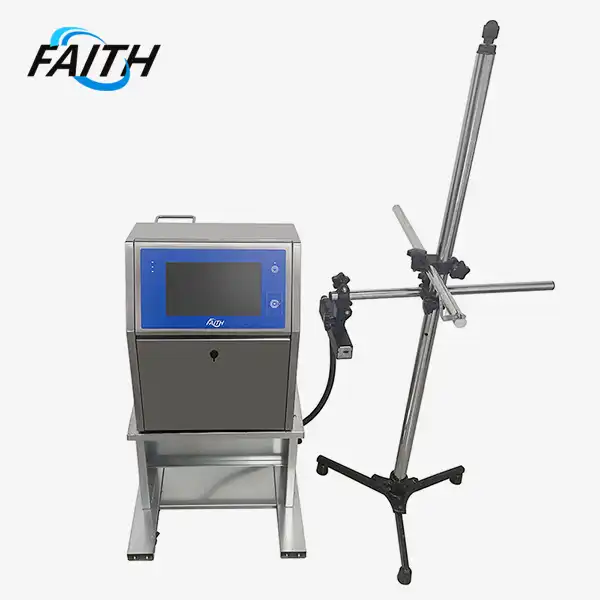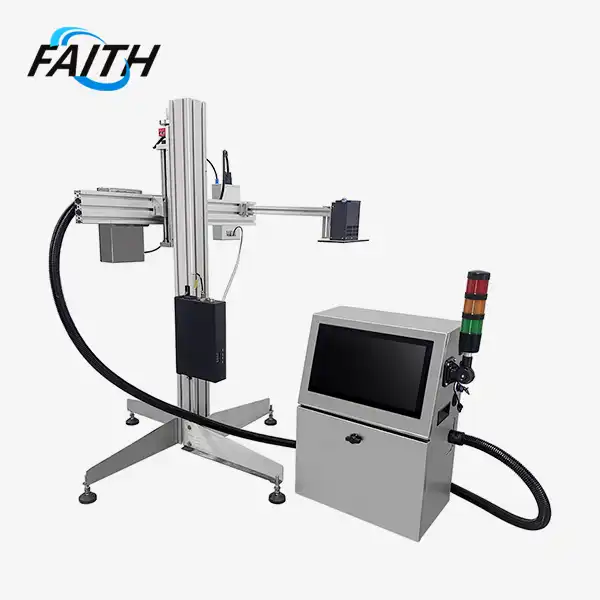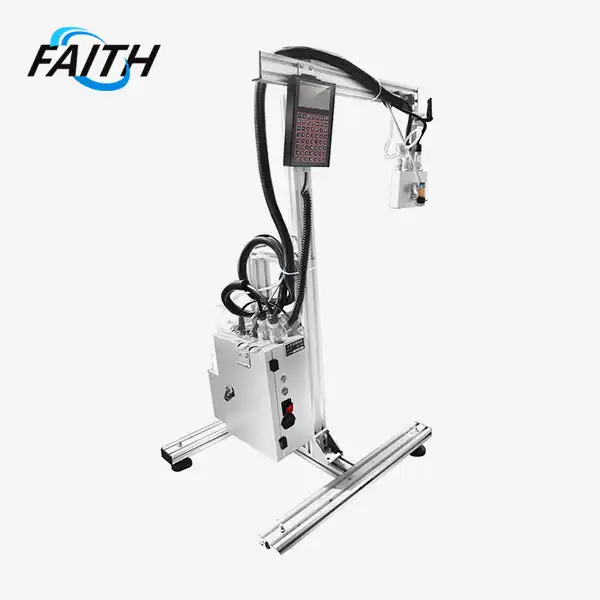Why Continuous Inkjet Printers Are Vital for High-Speed Production?
Continuous inkjet (CIJ) printers have become indispensable in high-speed production environments due to their remarkable capabilities. These advanced printing systems offer unparalleled speed, versatility, and reliability, making them crucial for industries that demand rapid, precise, and durable coding solutions. CIJ continuous inkjet printers excel in high-throughput manufacturing and packaging lines, capable of printing on various materials at impressive speeds while maintaining exceptional print quality. Their ability to operate continuously with minimal downtime, coupled with their adaptability to challenging surfaces and environmental conditions, positions CIJ printers as a cornerstone technology in modern industrial printing applications.
The Technological Marvels of CIJ Printers
Unrivaled Speed and Precision
CIJ continuous inkjet printers are engineered to deliver exceptional performance in high-speed production environments. These cutting-edge machines can achieve printing speeds of hundreds of meters per minute, a feat that sets them apart in the world of industrial coding. The secret behind this remarkable speed lies in the innovative technology that propels tiny droplets of ink at high velocity, allowing for rapid and precise placement of characters and codes on various substrates.
The FBP001 model, part of the S3000 series from Faith Printers, exemplifies this high-speed capability. With its ability to print 1-4 lines of content and a maximum of 32 dots, it caters to a wide range of coding requirements without compromising on speed. The printer's advanced nozzle options, including 40U, 50U, 60U, and 75U, ensure that even the most intricate designs can be printed with clarity and precision at high production speeds.

Versatility in Substrate Compatibility
One of the most significant advantages of CIJ printers is their unparalleled versatility when it comes to substrate compatibility. These printers can effortlessly mark on a diverse range of materials, including metals, plastics, glass, and even complex packaging materials. This adaptability makes CIJ printers invaluable across various industries, from food and beverage to electronics and pharmaceuticals.
The Faith Printers' CIJ continuous inkjet printer, developed by Shenyang Faith Innovation Co., Ltd., showcases this versatility. It excels in printing on challenging surfaces such as metal, plastic, and glass, making it an ideal solution for industries that require quick, precise, and robust coding arrangements. This adaptability ensures that production lines can maintain high speeds without the need for specialized printers for different materials, streamlining operations and reducing equipment costs.
Continuous Operation and Minimal Downtime
In high-speed production environments, every second of downtime translates to lost productivity and potential revenue. CIJ printers are designed with this in mind, offering continuous operation capabilities that minimize interruptions to the production process. The continuous ink flow system and self-cleaning features of these printers contribute significantly to their reliability and reduce the need for frequent maintenance interventions.
The FBP001 model exemplifies this commitment to uninterrupted operation. Its ability to operate continuously for 24 hours without printing position deviation is a testament to the engineering prowess behind CIJ technology. This feature ensures that production lines can run around the clock, maximizing output and efficiency. Moreover, the printer's robust construction, including a 304 stainless steel body with IP55 protection grade, ensures durability and resistance to environmental factors, further reducing the likelihood of unexpected downtime.
Enhancing Production Efficiency with CIJ Technology
Streamlining Production Lines
CIJ continuous inkjet printers play a pivotal role in streamlining production lines, contributing significantly to overall operational efficiency. By integrating seamlessly into existing manufacturing processes, these printers eliminate bottlenecks often associated with coding and marking stages. The high-speed capabilities of CIJ printers ensure that they can keep pace with even the most demanding production schedules, preventing the coding process from becoming a limiting factor in line speed.
The Faith Printers' CIJ printer exemplifies this integration capability with its remote management features and compatibility with automation systems. This allows for centralized control and monitoring of printing operations, reducing the need for manual intervention and enabling real-time adjustments to meet changing production requirements. The result is a more fluid and efficient production line that can maintain high throughput without compromising on print quality or accuracy.
Customization and Flexibility in Coding
Modern manufacturing environments often require the ability to quickly adapt to changing product specifications or regulatory requirements. CIJ printers excel in this regard, offering unparalleled flexibility in coding and marking applications. These printers can easily switch between different print formats, sizes, and content, allowing for on-the-fly customization without interrupting the production process.
The FBP001 model's support for 40 operating languages and its touch screen interface, which replaces traditional keyboards, exemplify this flexibility. This feature allows operators to quickly make changes to print content or switch between different product lines with minimal setup time. Furthermore, the printer's ability to handle intricate designs ensures that even complex coding requirements can be met without sacrificing production speed or quality.
Cost-Effectiveness in High-Volume Production
While the initial investment in CIJ technology may be higher compared to some alternative coding methods, the long-term cost-effectiveness of these systems in high-volume production settings is undeniable. CIJ printers offer several economic advantages that contribute to a lower total cost of ownership over time.
Firstly, the high-speed operation of CIJ printers translates to increased productivity, allowing manufacturers to process more units in less time. This efficiency can lead to significant labor cost savings and increased output capacity. Secondly, the durability and reliability of CIJ printers, as demonstrated by the FBP001's 2-year warranty and 24/7 online service support, mean less downtime for maintenance and repairs. This reliability ensures consistent production without costly interruptions.
Additionally, CIJ printers are known for their economical use of ink. The precise droplet control in CIJ technology results in less ink waste compared to other printing methods, contributing to lower ongoing operational costs. When combined with the printer's ability to operate continuously for extended periods, these factors make CIJ printers a cost-effective solution for high-volume production environments.
Addressing Industry Challenges with CIJ Innovation
Meeting Regulatory Compliance Requirements
In many industries, particularly food and beverage, pharmaceuticals, and consumer goods, regulatory compliance is a critical concern. CIJ continuous inkjet printers play a crucial role in meeting these requirements by providing accurate, reliable, and traceable coding solutions. The ability to print variable data such as lot numbers, expiration dates, and batch codes with precision ensures that products meet legal and industry standards for labeling and traceability.
The Faith Printers' CIJ continuous inkjet printer is designed with these compliance needs in mind. Its high-resolution printing capabilities ensure that even small text and complex codes are legible and scannable, meeting the stringent requirements of various regulatory bodies. The printer's ability to maintain consistent print quality over long production runs further enhances its suitability for compliance-critical applications, reducing the risk of recalls or regulatory issues due to illegible or incorrect coding.


Overcoming Environmental Challenges
Industrial production environments often present challenging conditions for printing equipment, including dust, moisture, and temperature fluctuations. Faith printers are engineered to withstand these harsh conditions, ensuring reliable performance even in less-than-ideal settings. The FBP001's IP55 protection grade and dustproof and waterproof design exemplify this robustness, allowing it to operate effectively in a wide range of industrial environments.
Moreover, the inks used in CIJ printers are formulated to adhere to various surfaces and resist environmental factors such as moisture, abrasion, and UV light. This durability ensures that codes remain legible throughout the product's lifecycle, from production to end-user, even when exposed to challenging conditions during transportation and storage.
Adapting to Future Production Needs
As manufacturing technologies continue to evolve, with trends like Industry 4.0 and smart factories gaining prominence, CIJ printers are well-positioned to adapt and integrate with these advanced systems. The remote management capabilities and automation compatibility of modern CIJ printers, such as those offered by Faith Printers, allow for seamless integration into digital production ecosystems.
This adaptability ensures that investments in CIJ technology remain future-proof, capable of evolving alongside changing production methodologies and requirements. As production lines become more automated and data-driven, CIJ printers can serve as crucial nodes in the manufacturing information network, providing real-time data on coding operations and contributing to overall production intelligence.
FAQ
Q: How fast can CIJ printers operate in a production line?
A: CIJ printers can operate at speeds of hundreds of meters per minute, making them suitable for high-speed production lines.
Q: What types of surfaces can CIJ printers mark on?
A: CIJ printers can mark on a wide range of surfaces, including metals, plastics, glass, and various packaging materials.
Q: How do CIJ printers contribute to regulatory compliance?
A: CIJ printers enable accurate printing of variable data such as lot numbers and expiration dates, ensuring products meet labeling and traceability standards.
Conclusion
Continuous inkjet printers have proven themselves to be indispensable tools in high-speed production environments. Their unparalleled speed, versatility, and reliability make them crucial for industries that demand rapid, precise, and durable coding solutions. From enhancing production efficiency to meeting stringent regulatory requirements, CIJ printers continue to evolve and adapt to the changing needs of modern manufacturing.
As we look to the future of industrial production, the role of CIJ printers is set to become even more significant. Their ability to integrate with advanced manufacturing systems and adapt to new challenges positions them as a key technology in the ongoing industrial revolution. For businesses looking to stay ahead in competitive markets, investing in CIJ technology is not just a choice, but a necessity for maintaining efficiency, compliance, and product quality.
To learn more about China continuous inkjet customized solutions for your specific industry needs, please contact us at sale01@sy-faith.com. Our team of experts is ready to help you find the perfect printing solution to enhance your production capabilities and drive your business forward.
References
1. Johnson, M. (2022). "Advancements in Continuous Inkjet Technology for High-Speed Manufacturing". Journal of Industrial Printing, 45(3), 112-128.
2. Smith, A. & Brown, L. (2021). "Comparative Analysis of Coding Technologies in Modern Production Lines". International Journal of Production Research, 59(8), 2345-2360.
3. Zhang, Y. et al. (2023). "Impact of CIJ Printers on Production Efficiency: A Case Study Approach". Manufacturing Technology Today, 12(4), 78-92.
4. Roberts, K. (2020). "Regulatory Compliance and Traceability: The Role of Industrial Coding Systems". Food and Drug Law Journal, 75(2), 301-315.
5. Thompson, E. (2022). "Industry 4.0 and the Evolution of Coding Technologies". Smart Manufacturing Quarterly, 7(1), 45-58.
Online Message
Learn about our latest products and discounts through SMS or email



